I remember when I was pregnant with my first baby I abstained from most sources of caffeine, including chocolate and (my favourite) coffee, in the hopes that I would have a calmer and more relaxed baby.
I also did pregnancy yoga and tried to maintain a relaxed lifestyle, going for lovely long walks by the beach in the morning, followed by a stretching session. Ahh, the luxury of a childfree existence!
Despite all of my careful pregnancy preparations, my first baby is a highly sensitive individual.
As a newborn, that translated to a very upset and difficult to soothe baby, who was particularly sensitive to everything I ate and did.
Nothing Could Have Changed Him!
Nothing I did or did not do in pregnancy would have changed that – it is just the way he is genetically designed, as with so many babies – temperament is largely hard-wired before birth.
I did subsequently read, however, that consuming caffeine during your pregnancy is thought to decrease your baby’s sensitivity to caffeine in breastmilk after birth.
The Key!
With my second baby I didn’t give up my daily coffee, and I didn’t give up chocolate. I also didn’t consume anything to excess. The key I believe, is moderation.
So it’s ok to eat chocolate while you’re pregnant?
A Finnish study reported in New Scientist magazine showed that mums that ate chocolate every day during pregnancy were more likely to say they had happy babies, and stressed mums that ate chocolate were more likely to say their baby was less fearful in new situations.
Although scientists don’t know exactly why, there is a theory that the indulgence of chocolate makes mum’s feel happier and less stressed during pregnancy, or perhaps those mums are generally more relaxed.
There is also some research from Yale University to show that mums who eat (or drink) chocolate during pregnancy have a lower risk of pre-eclampsia, the dangerous high blood pressure condition.
What about caffeine in pregnancy?
The main concern with chocolate is its contribution to your overall caffeine intake. Australian guidelines for pregnant mums are to limit your caffeine to 200 mg per day. This is based on research that links high caffeine intake to risk factors for babies including low birth weight.
I would also add that everyone has differing levels of sensitivity to caffeine.
If you or your partner are particularly sensitive to caffeine (for example a cup of coffee gives you the feeling of a racing heart), then I would stick to a lower intake as your baby is also more likely to be sensitive to caffeine.
Is caffeine ok for breastfeeding mums?
Just like us, babies are all different and 200 mg of caffeine may be just fine for your friend’s baby, but may cause your baby to be fussy and have difficulty sleeping. Only a very small (around 1%) of your caffeine intake will be in your breast milk.
Caffeine levels in your breast milk will peak approximately 1 – 2 hours after eating or drinking it – so you can somewhat time your intake to reduce the likely impact on your baby (depending on how predictable your baby’s feeds are!).
Newborn babies also have a hard time processing caffeine through their liver – it takes days for the caffeine to leave their system.
What this means is that if you are consuming caffeine every day, the effects will build up in your baby’s system because they take so long to process it.
Try Cutting Down On Caffeine
So, if you have a newborn and she seems fussy or is having trouble sleeping, then you can try cutting down on your caffeine intake and giving your baby a couple of weeks to clear the caffeine out of their system – and then see if you think it has made a difference.
Remember that to avoid withdrawal symptoms yourself (such as a headache), ease off on the caffeine gradually – perhaps replacing coffee with tea, and then replace tea with herbal tea.
As your baby grows so does his ability to process caffeine, so you may be able to introduce a higher level of caffeine in the coming months. As always, follow your baby’s lead – they are quite good at letting you know how they’re feeling!
So how much chocolate can I eat?
The most important part is understanding how much caffeine is in your food.
You might know that caffeine can be found in coffee, tea, soft drink, some medications and of course chocolate.
The amount will vary depending on the strength of the drink, the type of beans or tea leaves used and how much you are drinking.
Some common caffeinated drinks are:
- Cafe Espresso – this ranges between 25 – 214 mg per espresso shot depending on the beans and the barista. The average is about 100 mg, but I’d be limiting the intake to a max of one a day!
- Instant coffee – approximately 70 mg per teaspoon of coffee, depending on the brand.
- Black or green tea – approximately 30 mg
- Can of coke – 32 mg in a 330 ml can
- Red Bull – each 250 ml can contains 80 mg of caffeine
- Surprisingly, in each tablet of Panadol Extra you will find 65 mg of caffeine!
How Much Caffeine Is In Chocolate?
But the question everyone wants to ask is… how much caffeine is in chocolate?
- 100g of dark chocolate contains around 120mg caffeine.
- 100g of milk chocolate contains about 20 mg of caffeine
But once again, it all comes down to moderation, so go get that slab of chocolate and enjoy every bite.
Did you eat chocolate or drink coffee during pregnancy? Tell us in the comments below.
We may get commissions for purchases made using links in this post. Learn more.
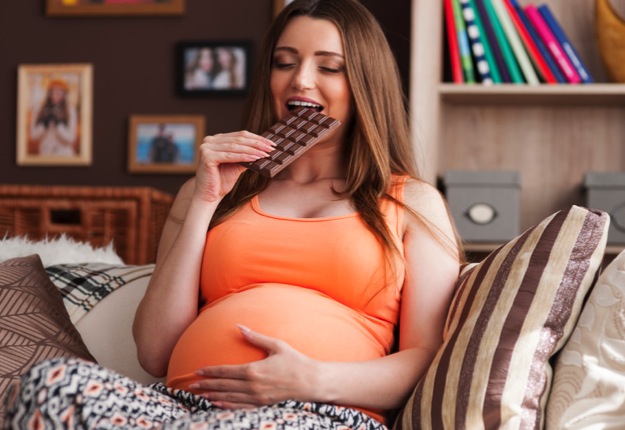

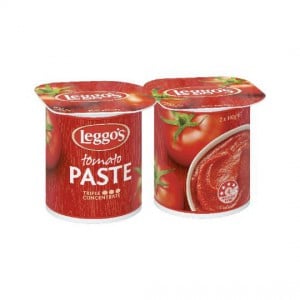
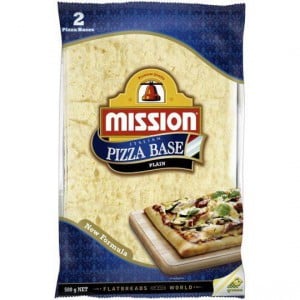


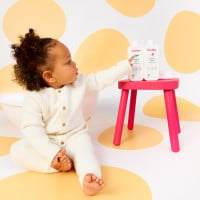






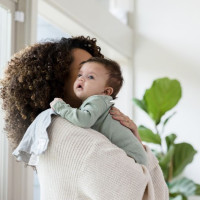






1:22 pm
8:47 am
10:06 am
7:08 am
11:09 pm
8:59 pm
2:50 pm
2:27 pm
9:38 pm
6:39 pm
6:52 am
8:30 pm
1:43 pm
3:14 pm
9:50 pm
- 1
- 2
- …
- 10
- »
Post a comment